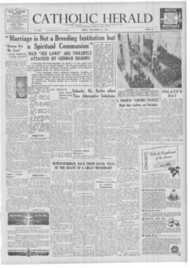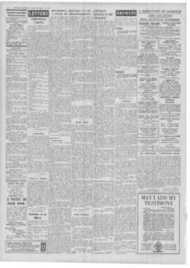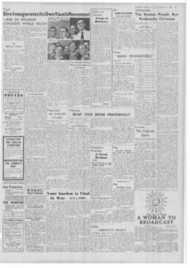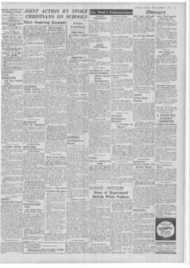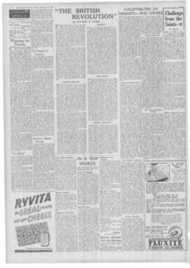Page 1, 11th December 1942
Page 1

Report an error
Noticed an error on this page?If you've noticed an error in this article please click here to report it.
Tags
Share
Related articles
Darlan Throws New Light On The Intricacy Of The French...
Banning Of London's Gaullist Paper
After A Recent Visit To France, E. W. Ashcroft Writes:
Priest Interned With Reynaud And Mandel Released
A FRENCH " EMPIRE COUNCIL"
Might Unite Gaullists and Darlanists
Is there a way of bringing Gaullists and Darlanists together? America is reported to have promised the Fighting French that the Admiral will not be allowed to make use of his present position in order to impose on his compatriots a post-war regime other than that of their own choosing. It is known that Gaullists have been worried at the possibility that the arrangement with Darien may become permanent. Thus, such pledges on she part of America may be the beginnings of a rapprochement.
By ANDREW BOY LE
The problem of " the worm in the fruit " (General Catroux's definition of Darlan) is puzzling
many well-informed Frerlchmen in London—those rnorc cautious in diagnosis are frankly sceptical.
Said one of them on Tuesday:
" Catroux seems to have erred in stating that Darlan's position in North Africa is equivocal and amounts to non belligerency. The far-reaching agreement between the American General Eisenhower and GovernorGeneral Boisson is proof of the error. According to its tea'rns, French warships and ports will be put immediately at the disposal of the Allies. In addition, General Giraud, bolding his powers under Darlan—who claims his powers from Petain—has called on all French forces in Africa to war against the Axis. Doesn't that make Catrouses statement rather questionable?
"Then if you study what Catroux has said since coruing to London, you will find that he has adopted quite an independent attitude towards the French National Committee under de Gaulle. Not once has he referred to it by name. Only once has be mentioned the name of General de Gaulle."
CONCRETE PROPOSALS "The situation does not seem nearer solution." I said. "Have Frenchmen any concrete proposals?"
" Yes," he answered. " Despite the official uncompromising hostility to any idea of settlement, many Fighting Frenchmen would welcome something like an " Empire Council," in which Gaullist and Darlanist elements could be represented."
I bulled in: " Would the removal of Darlan end the present tension? Honestly now?"
"No. it would not. I don't think —I repeat—that the matter is quite so simple. It seems to be as much a matter of ideologies as of an individual—Darlan. The admiral once gone, the same problem would present itself unsolved in the case of Giraud, of Nogues, and of Boisson. They all support Darlan's policy, recognise one chief, and still back Vichy and the Marshal
', And it would appear that the gulf between the ideologies of London and Algiers is absolute. The one claims to be thoroughly democratic, yet it is debatable whether all its mili
tary personnel share its ideas. The other claims to be hierarchical and opposed to Popular Front leanings." " Do you think," I said, " that an attempted settlement would be unfair to the Fighting French?
" Not at all. The situatioa is quite
clear. France is what counts. And the balance favours the five million Frenchmen ad thirty million natives in North Africa!'
MAISKY'S PROTEST
" Whirl bearing has Maisky's alleged protest the other day on the whole position?" I asked.
" It is one more indication of the de Gaullists playing up the democratic card. According to the current version of the story, Ambassador Maisky, in a candid conversation with Eden, protested against the Darlan business. His ground waS " morality." American Left Wing broadcaster Frederick Kuh—who sent the news from London although it was reproduced as coming from New York—recorded Maisky's indignation at France's declaration of war on the Soviet in the summer of 1941. Dalian was then chief of the French Government. Actually, France simply broke diplomatic relations. Conveniently enough, Stalin's ' morality ' prior to the summer of 1941 was not alluded to."
" Will Maisky's dernarche help?"
"No. The Russians may have been seeking military representation in
Africa; that idea was suggested in the Times of to-day (Tuesday). That would seem a matter for Washington, but with Giraud in the picture it is unlikely. I think Britain and America should (and will) leave Frenchmen to settle their own accounts."
" What do you think of FrancoBritish relations?" was my final question.
" They are not easy. The Mers el Kebir affair was a problem. But relations Call be re-established satisfactorily and sensibly. Of that I am sure,
" At the moment Britain guards an ominous, silence. Parliament has gone into secret session, the press rages, but neither Churchill nor Eden say anything openly against the French authorities in North Africa.
" It is to be hoped that Britain will not adopt an attitude of intransigence. Otherwise—and I don't think you made this sufficiently clear and unambiguous last week—the monopoly of relations with France will be exclusively America's."
blog comments powered by Disqus


